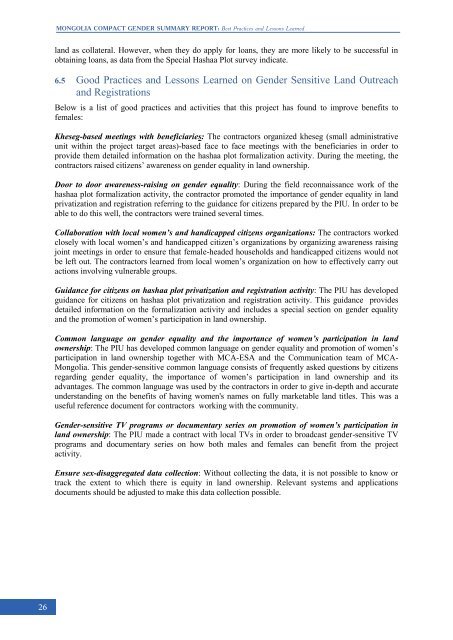Ulaanbaatar 2013
Ulaanbaatar 2013
Ulaanbaatar 2013
Create successful ePaper yourself
Turn your PDF publications into a flip-book with our unique Google optimized e-Paper software.
Mongolia Compact Gender Summary Report: Best Practices And Lessons Learnedland as collateral. However, when they do apply for loans, they are more likely to be successful inobtaining loans, as data from the Special Hashaa Plot survey indicate.6.5 Good Practices and Lessons Learned on Gender Sensitive Land Outreachand RegistrationsBelow is a list of good practices and activities that this project has found to improve benefits tofemales:Kheseg-based meetings with beneficiaries: The contractors organized kheseg (small administrativeunit within the project target areas)-based face to face meetings with the beneficiaries in order toprovide them detailed information on the hashaa plot formalization activity. During the meeting, thecontractors raised citizens‟ awareness on gender equality in land ownership.Door to door awareness-raising on gender equality: During the field reconnaissance work of thehashaa plot formalization activity, the contractor promoted the importance of gender equality in landprivatization and registration referring to the guidance for citizens prepared by the PIU. In order to beable to do this well, the contractors were trained several times.Collaboration with local women’s and handicapped citizens organizations: The contractors workedclosely with local women‟s and handicapped citizen‟s organizations by organizing awareness raisingjoint meetings in order to ensure that female-headed households and handicapped citizens would notbe left out. The contractors learned from local women‟s organization on how to effectively carry outactions involving vulnerable groups.Guidance for citizens on hashaa plot privatization and registration activity: The PIU has developedguidance for citizens on hashaa plot privatization and registration activity. This guidance providesdetailed information on the formalization activity and includes a special section on gender equalityand the promotion of women‟s participation in land ownership.Common language on gender equality and the importance of women’s participation in landownership: The PIU has developed common language on gender equality and promotion of women‟sparticipation in land ownership together with MCA-ESA and the Communication team of MCA-Mongolia. This gender-sensitive common language consists of frequently asked questions by citizensregarding gender equality, the importance of women‟s participation in land ownership and itsadvantages. The common language was used by the contractors in order to give in-depth and accurateunderstanding on the benefits of having women's names on fully marketable land titles. This was auseful reference document for contractors working with the community.Gender-sensitive TV programs or documentary series on promotion of women’s participation inland ownership: The PIU made a contract with local TVs in order to broadcast gender-sensitive TVprograms and documentary series on how both males and females can benefit from the projectactivity.Ensure sex-disaggregated data collection: Without collecting the data, it is not possible to know ortrack the extent to which there is equity in land ownership. Relevant systems and applicationsdocuments should be adjusted to make this data collection possible.26Page 26 of 80


